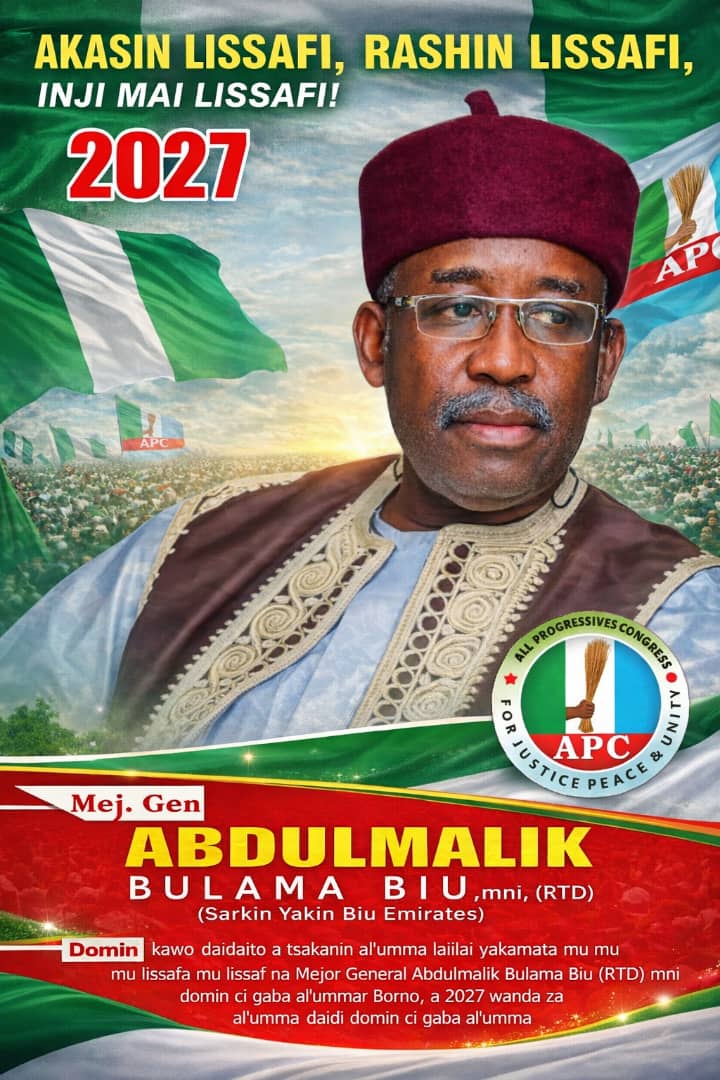society
There Was a Country: Chinua Achebe’s Testament of Nigeria’s Lost Promise

There Was a Country: Chinua Achebe’s Testament of Nigeria’s Lost Promise
society
GENERAL BULAMA BIU APPLAUDS SUCCESSFUL APC CONGRESSES, URGES NEW EXECUTIVES TO FOCUS ON GOOD GOVERNANCE

GENERAL BULAMA BIU APPLAUDS SUCCESSFUL APC CONGRESSES, URGES NEW EXECUTIVES TO FOCUS ON GOOD GOVERNANCE
Major General Abdulmalik Bulama Biu (Rtd), mni, Sarkin Yakin Biu, has extended his heartfelt congratulations to the newly elected Ward and Local Government Executives of the All Progressives Congress (APC) following the successful conduct of the party congresses across Borno State.
In a statement he personally issued to mark this significant milestone, General Biu commended the peaceful and well-organized nature of the congresses, highlighting them as a testament to the unity, maturity, and democratic spirit that characterize the APC. He praised the leadership, stakeholders, and dedicated members of the party for their commitment and discipline, which contributed to the smooth and credible outcome of the elections.
Addressing the newly elected executives, Biu emphasized that their victory is not just an honor, but a mandate for greater service, responsibility, and sacrifice. “Our party faithful look up to you to help shape leadership choices that are credible, experienced, and deeply committed to delivering the dividends of democracy to our people,” he stated, urging them to work sincerely and fairly to strengthen the party at the grassroots level.
He called upon the new leaders to promote unity among members and support good governance to ensure the continued progress of Borno State and the nation as a whole.
In closing, Major General Biu assured the new executives of his unwavering support and extended his best wishes for their tenure, wishing everyone a prosperous and blessed Ramadan.
society
UNCOMMON RECOGNITION: Ogun Governor Dapo Abiodun Gifts Car, House to Nigeria’s Best Teacher

UNCOMMON RECOGNITION: Ogun Governor Dapo Abiodun Gifts Car, House to Nigeria’s Best Teacher
By George Omagbemi Sylvester
“State and federal authorities jointly honour Solanke Francis Taiwo in Abeokuta, underscoring the strategic role of teacher motivation and education reform in Nigeria’s human capital development agenda.”
In a move that has sharply refocused national attention on education excellence, Dapo Abiodun has formally rewarded Mr. Solanke Francis Taiwo, a primary school teacher from Ansa-Ur-Deen Main School I, Kemta Lawa, Abeokuta, with a brand-new car and a two-bedroom house following his emergence as Nigeria’s Overall Best Primary School Teacher for the 2025/2026 academic session. The presentation occurred at the Governor’s Office in Oke-Mosan, Abeokuta on 20 February 2026, witnessed by the Commissioner for Education, Science and Technology and senior ministry officials.
Mr. Solanke’s achievement was first nationally recognised earlier this year at the National Teachers’ Summit in Abuja, where he received a ₦50 million cash award for his outstanding dedication and measurable impact in the classroom.
Governor Abiodun clarified that while the bungalow is being provided under the Ogun State Housing Scheme, the car gift was donated by the Federal Government as part of its broader national recognition of exceptional educators. The governor used the occasion not just to celebrate Solanke’s personal excellence, but to showcase what he described as the tangible outcomes of focused policy and sustained investment in education.
Speaking on the reforms driving this achievement, Prof. Abayomi Arigbagbu, the state’s Education Commissioner, tied the success to the Ogun State Education Revitalisation Agenda; a multi-pillar programme that prioritises curriculum enhancement, improved school management, teacher welfare, infrastructure upgrades, digital learning and professional development. “When you implement policies consistently and efficiently, you will continue to record results,” Arigbagbu said, pointing to back-to-back national accolades for Ogun teachers as evidence of meaningful sector transformation.
Experts in education policy have long emphasised the strategic importance of recognition and reward in strengthening teacher motivation and retention. As educational researcher Dr. Linda Darling-Hammond noted, “Sustained improvements in learning outcomes require environments where teachers are both valued and empowered.” While Nigeria grapples with challenges in schooling quality and teacher support, recognitions of this nature symbolise a positive paradigm shift when carefully institutionalised.
Critically, this development also underscores the often-neglected intersection between governance and human capital development; where targeted incentives can elevate the profession’s status and potentially improve learner outcomes. State authorities in Ogun have argued that such incentives are part of a broader ecosystem approach to education reform.
Mr. Solanke, in his remarks, urged fellow educators to view his recognition as a call to persist in uplifting teaching standards. “I promise to continue giving my best to make Ogun State proud,” he said, reflecting a deep professional commitment that goes beyond personal accolades.
In a climate where education systems across Africa seek scalable models of reform, the province’s spotlight on teacher excellence resonates beyond Ogun’s borders, offering a compelling case study of policy, performance and public affirmation converging for societal benefit.
society
Shot And Turned Away: When Hospitals Demand Police Reports Before Saving Lives

Shot And Turned Away: When Hospitals Demand Police Reports Before Saving Lives
By George Omagbemi Sylvester
“How Nigerian Law Confronts a Deadly Culture of Bureaucracy in Emergency Care.”
When a gunshot victim is rushed into a Nigerian hospital, the law is unequivocal: treatment must come first. Yet, across the country, allegations persist that some medical facilities still demand police reports before administering emergency care; a practice that lawmakers have expressly outlawed.
The legal framework is clear. Section 20 of the National Health Act provides that a health care provider “shall not refuse a person emergency medical treatment for any reason whatsoever.” The wording is deliberate and absolute. Gunshot wounds, by medical definition, constitute emergencies.
To close loopholes and confront what officials once described as a “culture of avoidable deaths,” the National Assembly enacted the Compulsory Treatment and Care for Victims of Gunshot Act. The law mandates all public and private hospitals to treat gunshot victims immediately, without demanding police clearance or advance payment. It further criminalises any attempt (including by law enforcement officers) to obstruct treatment.
Former Senate President Bukola Saraki, who presided over the passage of the 2017 Act, described it at the time as “a life-saving intervention to end needless bureaucracy that costs human lives.” Legal scholars have echoed that position. Professor Chidi Odinkalu, a former chair of Nigeria’s National Human Rights Commission, has consistently argued that emergency care is not a privilege but “a constitutional and human rights imperative rooted in the right to life.”
Medical ethics experts are equally firm. Dr. Osahon Enabulele, former president of the World Medical Association, has noted that “the primary duty of every physician is preservation of life. Administrative processes must never supersede clinical urgency.”
Hospitals are indeed required to notify the police when treating gunshot wounds, largely for investigative and security purposes. However, legal authorities stress that notification is not a precondition to treatment. It follows care; it does not precede it.
Failure to comply carries potential criminal liability under the 2017 Act, including fines and imprisonment for responsible officials. Where delayed treatment results in death, civil and criminal proceedings may arise under Nigeria’s broader legal framework governing negligence and wrongful death.
Despite the clarity of the statutes, enforcement remains uneven. Human rights advocates continue to document complaints, though comprehensive nationwide data on prosecutions under the Act is limited.
The law’s message, however, is unmistakable: oxygen must never wait for paperwork. In a country grappling with security challenges, the line between life and death can be measured in minutes. The courts, the legislature and medical ethics are aligned; emergency care is an obligation, not an option.
-

 celebrity radar - gossips6 months ago
celebrity radar - gossips6 months agoWhy Babangida’s Hilltop Home Became Nigeria’s Political “Mecca”
-

 society6 months ago
society6 months agoPower is a Loan, Not a Possession: The Sacred Duty of Planting People
-

 society5 months ago
society5 months agoReligion: Africa’s Oldest Weapon of Enslavement and the Forgotten Truth
-

 news6 months ago
news6 months agoTHE APPOINTMENT OF WASIU AYINDE BY THE FEDERAL GOVERNMENT AS AN AMBASSADOR SOUNDS EMBARRASSING





